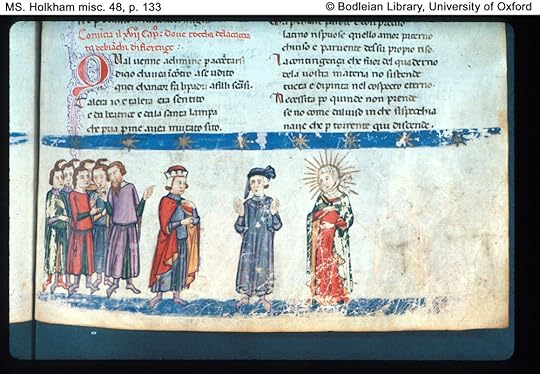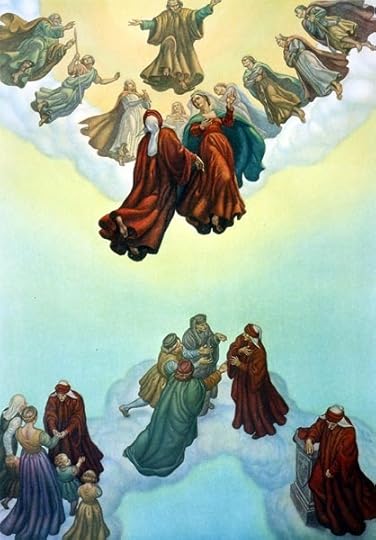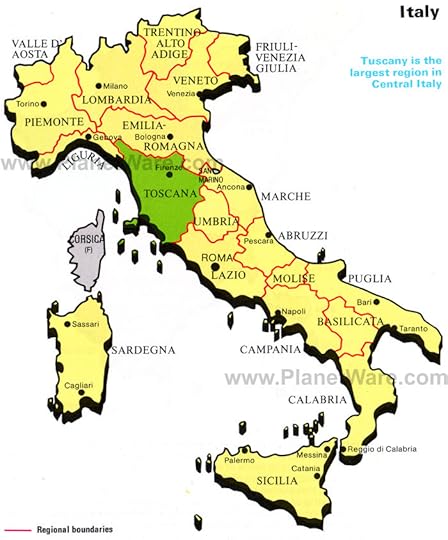Classics and the Western Canon discussion
Divine Comedy, Dante
>
Paradiso 17: Prophecies of Dante's Future
date newest »
newest »
 newest »
newest »
 http://www.lockportstreetgallery.com/...
http://www.lockportstreetgallery.com/...
Salvador Dali: Paradiso Canto 17. “Cacciaguida Sees Dante’s Exile in God.”
 Lily wrote: "http://www.lockportstreetgallery.com/...
Lily wrote: "http://www.lockportstreetgallery.com/...Salvador Dali: Paradiso Canto 17. “Cacciaguida Sees Dante’s Exile in God.”"
Nice!
 (Clearer image:) http://www.worldofdante.org/media/ima...
(Clearer image:) http://www.worldofdante.org/media/ima...Sandro Botticelli: Paradiso Canto XVII.1. “Fifth Planetary Sphere (Heaven of Mars); Cacciaguida Prophesies Dante's Exile, But Also His Eternal Fame.” c.1480 - c.1495. Drawing.
(So, where is Cacciaguida?)

 (Clearer image:) http://www.worldofdante.org/media/ima...
(Clearer image:) http://www.worldofdante.org/media/ima...
John Flaxman: Paradiso Canto XVII.106. “Dante Learns of His Future from Cacciaguida.” 1793. Engraving.
Cacciaguida (b. 1091 – d. c.1147): Dante's great-great-grandfather, who died as a crusader in the Holy Land during the Second Crusade.
Also a brief entry here: http://en.wikipedia.org/wiki/Cacciaguida
 For Paradiso Canto XVII images from the Bodleian Library 14th century manuscript try these:
For Paradiso Canto XVII images from the Bodleian Library 14th century manuscript try these:http://www.bodley.ox.ac.uk/dept/scwms...

Paradiso Canto XVII. "Cacciaguida, Followed by a Group of Souls, Beside Dante and Beatrice."
http://www.bodley.ox.ac.uk/dept/scwms...

Paradiso Canto XVII. "Cacciaguida, Followed by Souls, Talks to Dante and Beatrice."
 http://etcweb.princeton.edu/dante/pdp...
http://etcweb.princeton.edu/dante/pdp...
Amos Nattini: Paradiso Canto XVII. "Qual venne a Climene, per accertarsi 1923.
 http://www.worldofdante.org/media/ima...
http://www.worldofdante.org/media/ima...Giovanni di Paolo: Paradiso Canto XVII.25. “Dante Is Expelled from Florence.” c.1450. Manuscript illumination. Yates Thompson 36. British Library.

 Firenze: Founded by the Romans in the first century B. C. E., Florence is located on the Arno River at the foot of the Apennine mountain range. For most of the Middle Ages it was overshadowed politically and economically by two other Tuscan cities: Lucca and Pisa. As the thirteenth century progressed, however, the commune increasingly became the most prosperous and powerful city in Tuscany. It owed its economic prosperity primarily to banking, to the marketing of re-finished imported cloth, and to its close political connections with the papacy and the Angevin kingdom of Sicily. Eventually, by the early fourteenth century, Florence had begun to produce its own cloth for export. In the last quarter of the thirteenth century, the Guelf elite became increasingly divided by rivalry and conflict. By 1300 two principal factions had emerged in the city and countryside: the pro-papal Blacks and the pro-imperial Whites. Identified with the White faction, Dante was forced into exile in 1302 and never returned to his native city.
Firenze: Founded by the Romans in the first century B. C. E., Florence is located on the Arno River at the foot of the Apennine mountain range. For most of the Middle Ages it was overshadowed politically and economically by two other Tuscan cities: Lucca and Pisa. As the thirteenth century progressed, however, the commune increasingly became the most prosperous and powerful city in Tuscany. It owed its economic prosperity primarily to banking, to the marketing of re-finished imported cloth, and to its close political connections with the papacy and the Angevin kingdom of Sicily. Eventually, by the early fourteenth century, Florence had begun to produce its own cloth for export. In the last quarter of the thirteenth century, the Guelf elite became increasingly divided by rivalry and conflict. By 1300 two principal factions had emerged in the city and countryside: the pro-papal Blacks and the pro-imperial Whites. Identified with the White faction, Dante was forced into exile in 1302 and never returned to his native city.Note associated with illustration above.
 http://people.wku.edu/darlene.applega...
http://people.wku.edu/darlene.applega...This map will show some of the major rivers in Italy, like the Po, the Arno, the Tiber, as well as Ravenna, Dante's site of exile.

 "And so my lady said to me: 'Send forth
"And so my lady said to me: 'Send forththe flame of your desire, and let it issue
with the clear imprint of its inner stamp, (9)
'not that our knowledge be increased by what you say but that you rehearse the telling of your thirst
so that the drink be poured for you.'"(12)
Dante (2012-07-18). Paradiso. (Kindle Locations 6980-6993). Random House, Inc. Hollander Translation.
What a convoluted way of saying "ask what you want to know so we can respond"!
Dante does proceed to ask his ancestor to predict his future. Cacciaguida warns Dante of his impending exile, still to come in the Canto's timeline but which had happened by the time Dante is writing. (I almost get a sense of someone confirming what was anticipated, especially given the foreshadowing from Inferno to which Dante alludes.)
 "'Yet I would not have you feel envious disdain
"'Yet I would not have you feel envious disdainfor your fellow-townsmen, since your life shall far outlast
the punishment of their treachery.'" (99)
Dante. Paradiso. (Kindle Locations 7203-7209). Ibid.
Cacciaguida foretells Dante's immortality?
 "I have learned things that, should I retell them,
"I have learned things that, should I retell them,would discomfort many with their bitter taste. (117)
"Yet, should I be a timid friend to truth,
I fear that I shall not live on for those
to whom our times will be the ancient days." (120)
Dante. Paradiso. (Kindle Locations 7249-7260). Ibid.
Here we see some evidence of Dante's ego and ambition.





BEATRICE AND CACCIAGUIDA already know what question is burning in Dante’s mind, but Beatrice nevertheless urges him to speak it, that by practicing Heavenly discourse he be better able to speak to men when he returns to Earth. So urged, Dante asks Cacciaguida to make clear the recurring DARK PROPHECIES OF DANTE’S FUTURE. Cacciaguida details DANTE’S COMING BANISHMENT FROM FLORENCE, identifies the patrons Dante will find, and assures Dante of his future fame. He warns Dante not to become bitter in adversity, assuring him that the Divine Comedy, once it becomes known, will outlive the proudest of the Florentines and bring shame to their evil memories for ages to come.
Reynolds/Sayers:
The prophesy of Dante’s exile: In the story, Cacciaguida’s words, foretelling to Dante the blow of exile that is to fall on him, are the culmination, and clarification, of all the dark and sinister hints he has heard from other souls in the course of his journey. In the allegory, the foretelling of Dante’s future is an instance of contingency which, though foreseeable by the souls in the mind of God, is not a predetermined fate.
Cacciaguida’s charge to Dante: Dante’s hesitancy as to his duty to relate in the world all he has heard and seen recall the misgivings he expressed to Virgil at the outset of his journey: “I am not Aeneas, I am not St Paul.” Virgil reassured him, and with that reassurance implied that, like Aeneas and like St Paul, Dante was by grace selected for a divinely ordained mission for the benefit of mankind. Now once again, and for the last time, Dante seeks confirmation of his calling. Is he to speak out and boldly rebuke vice? His ancestor’s reply leaves him in no doubt as to this or as to the purpose of his high privilege.